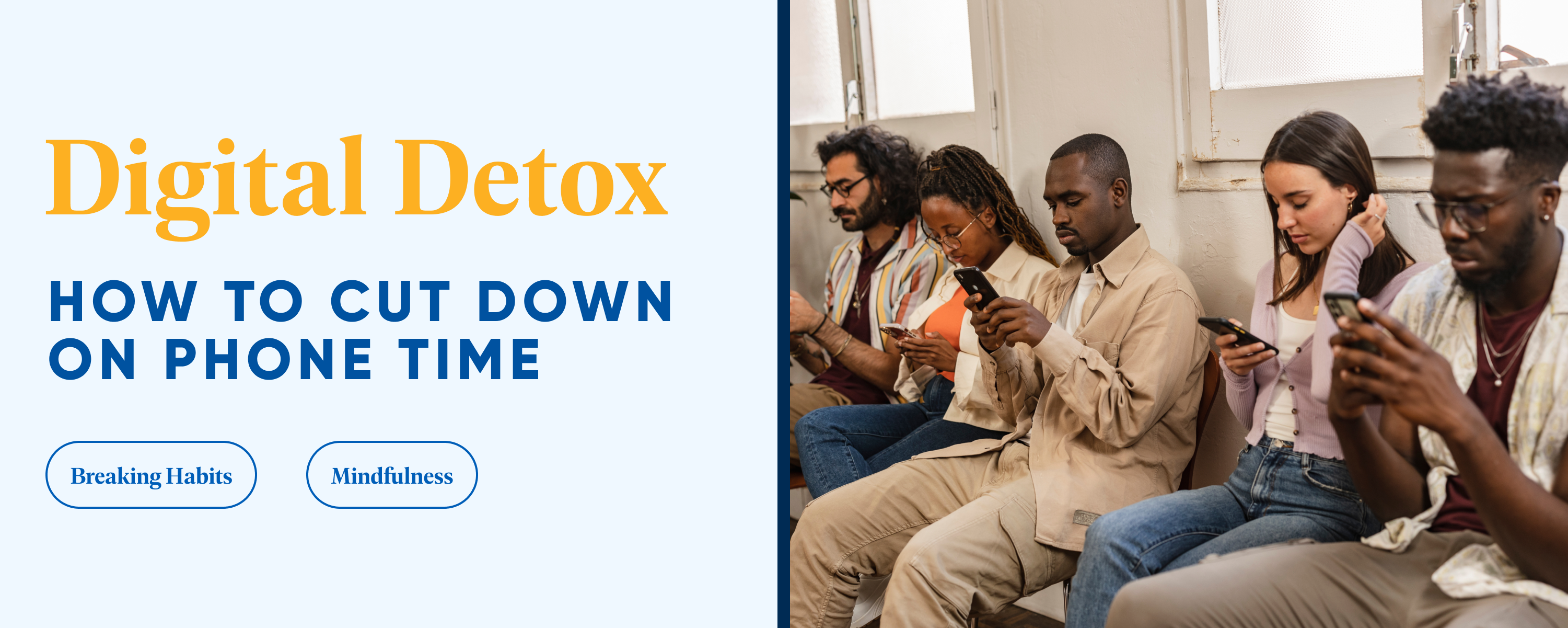Digital Detox: How to Cut Down on Phone Time

Digital Detox: How to Cut Down on Phone Time
In a world where our phones seem permanently attached to our hands, stepping away can feel like an impossible task.
The average American checks their phone a staggering 144 times per day, which equates to roughly once every 10 minutes. With sleep factored in, this number jumps to once every 7 ½ minutes. [1]
Problems Associated with Excessive Phone Use
- Eye Strain: Constant screen time can lead to tired, dry, and irritated eyes.
- Tech Neck: Poor posture while looking at screens can cause neck and shoulder pain.
- Poor Sleep: Blue light from screens disrupts melatonin production, leading to trouble falling asleep. [2]
- Increased Anxiety: Overuse of social media and constant connectivity can heighten stress and anxiety. [3]
- Reduced Focus: Frequent phone checks can diminish your ability to concentrate and complete tasks efficiently.
- Loneliness: Excessive screen time, particularly on social media, can lead to feelings of isolation and loneliness as online interactions often replace meaningful face-to-face connections.
Not Very Fun Fact: Loneliness may pose more of a threat than most realize. United States Surgeon General Dr. Murthy compared health risks associated with loneliness to smoking up to 15 cigarettes a day. [4]
A digital detox can help you reclaim your time, improve focus, and boost your mood. Here’s how to start cutting back on screen time without feeling completely disconnected.
Tips to Reduce Phone Time
- Set Clear Boundaries: Designate specific phone-free times and spaces, such as during meals or an hour before bed. Use "Do Not Disturb" mode to minimize interruptions.

- Monitor Your Usage: Utilize built-in tools like Screen Time (iOS) or Digital Wellbeing (Android) to track and limit your phone use. Set daily limits for apps that tend to consume your time.

- Declutter Your Digital Space: Remove or set limits on apps that are major time-wasters. Turn off unnecessary notifications to reduce the temptation to check your phone.

- Replace Screen Time with Screen-Free Activities: Engage in hobbies, read a book, or take a walk to fill the void left by less screen time. Keeping your hands and mind busy with non-screen activities can make the detox feel less restrictive.

- Make Your Phone Less Appealing: Change your screen to grayscale, use a less engaging wallpaper, or move distracting apps off your home screen to reduce their allure.

- Plan No-Tech Time Blocks: Start small by setting aside time each day for no-tech activities. Gradually increase the duration as you become more comfortable without your device.

- Socialize Offline: Make plans to meet friends or family in person, or opt for phone calls over texting for a more personal connection.

- Disconnect Before Bed: Implement a no-phone rule at least an hour before bed to avoid disrupting your sleep patterns and help improve your overall sleep quality.

- Occasionally Leave Your Phone at Home or in the Car: Remove your phone altogether from some activities by never bringing it in the first place, or by leaving it in your car or backpack instead of your pocket.

Conclusion
Excessive screen time, especially at night, disrupts melatonin production, leading to poor sleep. Taking a break from your phone can significantly benefit your health by reducing stress and improving sleep quality.
By unplugging, you're likely to feel more relaxed and present. So, if you’re currently doom-scrolling or glued to your mobile, consider this your sign to put the phone down and take a break. Your mind and body will thank you.
References
- https://www.reviews.org/mobile/cell-phone-addiction/
- https://www.pbs.org/newshour/health/loneliness-poses-health-risks-as-deadly-as-smoking-u-s-surgeon-general-says
- https://www.ncbi.nlm.nih.gov/pmc/articles/PMC9424753/
- https://www.sciencedirect.com/science/article/abs/pii/S0747563216307543












